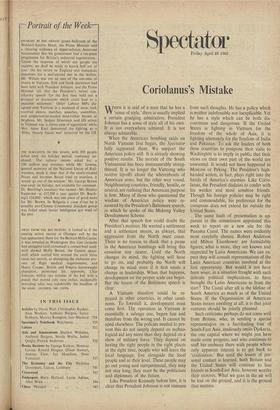Coriolanus's Mistake
WHEN it is said of a man that he has a `sense of style,' there is usually implied a certain grudging admiration. President Johnson has a sense of style all of his own. It is not everywhere admired. It is not always admirable.
When the American bombing raids on North Vietnam first began, the Spectator fully supported them. We support the American policy still. It is already showing positive results. The morale of the South Vietnamese has been immeasurably streng- thened. It is no longer the Vietcong who receive tip-offs about the whereabouts of American arms, but the other way round. Neighbduring countries, friendly, hostile, or neutral, are realising that American purpose is firm. Many of those who questioned the wisdom of American policy were re- assured by the President's Baltimore speech, in which he spoke of the Mekong Valley Development Scheme.
After that speech few could doubt the President's motives. He wanted a settlement and a settlement means, as always, that aggression from the North must cease. There is no reason to think that a pause in the American bombings will bring this cessation any nearer. Until the North changes its mind, the fighting will have to go on, and probably the North will change its mind even if it first needs a change in leadership. When that happens, development on the proper scale can begin. But the lesson of the Baltimore speech is clear.
A Vietnam situation could be re- peated in other countries, in other conti- nents. To forestall it, development must come first. The operation in Vietnam is essentially a salvage one, begun late and therefore from the wrong end. It cannot be aped elsewhere. The policies needed to pre- vent this do not simply depend on techno- logical aid any more than they depend on a show of military force. They depend on having the right people in the right places at the right time, people who will learn the local language, live aloniside the local people and at their level. These people may go out young and inexperienced, they may not stay long; they must be the politicians and diplomats of the future.
Like President Kennedy before him, it is clear that President Johnson is not immune from such thoughts. He 'has a policy which is neither indefensible nor inexplicable. Yet he has a style which can be both dis- courteous and dangerous. If the United States is fighting in Vietnam for the freedom of the whole of Asia, it is fighting ultimately for the freedom of India and Pakistan. To ask the leaders of both these countries to postpone their visits to Washington is to imply in public that their views on their own part of the world are unwanted. It would not have happened in Moscow or Peking. The President's high- handed action, in fact, plays right into the hands of America's enemies. Like Corio- lanus, the President disdains to confer with his weaker and most sensitive friends. Though his foreign policies may be right and commendable, his preference for the consensus does not extend far outside the United States.
The same fault of presentation is ap- parent in the commission appointed this week to report on a new site for the Panama Canal. The names were evidently most carefully chosen. Robert Anderson and Milton Eisenhower are formidable figures; what is more, they are known and respected by Latin Americans. We can ex- pect they will consult representatives of the Latin American countries involved at the first opportunity. But would it not have been wiser, in a situation fraught with such delicate political, implications, to have brought the Latin Americans in from the start? The Canal after all is the lifeline of South America as much as of the United States. If the Organisation of American States means anything at all, it is that joint ventures should be jointly planned.
Such criticisms perhaps do not come well from Britain, who, in sending a special representative on a fact-finding tour of South-East Asia, studiously omits Djakarta, the one capital where we might just have made some progress, and who continues to stuff her embassy there with people whose only apparent interest is to get back to `civilisation.' But until the lesson of per- sonal contact is learned, both Britain and the United States will continue to lose friends in South-East Asia, however worthy their motives. What we gain in the air will be lost on the ground, and it is the ground that matters.






























 Previous page
Previous page